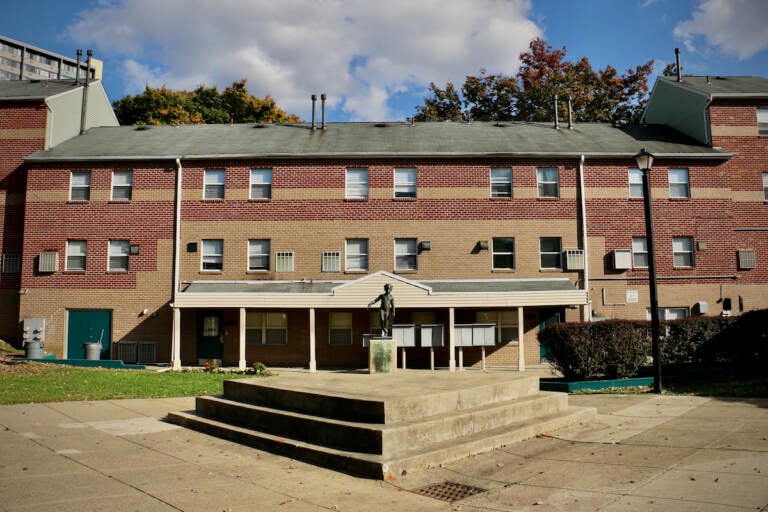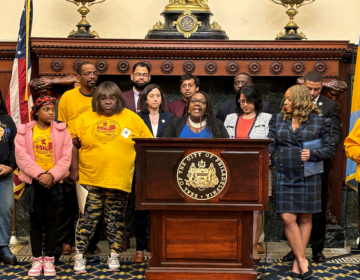Frank Rizzo, the UC Townhomes, and the fight to save Black Philadelphia
Section 8 housing in Philadelphia has been the source of community and political conflict for decades — and is re-emerging today in University City.

University City Townhomes in West Philadelphia. (Emma Lee/WHYY)
The current organizing fight to save the UC Townhomes, a Section 8 Project-based development at 40th and Market Streets slated for sale by owner Brett Altman this July, is haunted by the ghost of Frank Rizzo and the racist housing policies he represented.
Back in 1968, “University City” was still known as the Black Bottom and its residents were leading a fierce resistance to displacement through “urban renewal” by digging trenches and stretching barbed wire across the street. Frank Rizzo, then Philadelphia’s Police Chief and already positioning himself for his 1971 mayoral campaign, mobilized against that resistance both in the streets and the press.
When Rizzo was elected mayor, he moved quickly to sabotage what little efforts were underway to dismantle segregation in Philadelphia’s housing sector. His first casualty was the South Philly housing project at 2nd Street and Oregon Avenue known as Whitman Park. Local whites, joined by the police and building trades unions, had been picketing and sabotaging construction for months in an effort to keep Blacks out of their neighborhood. Rizzo used his power to halt construction and in response a federal lawsuit was filed against his administration for racial discrimination in housing.
Rizzo testified on the record in federal court that he was against ruining nice white neighborhoods by allowing public housing or Section 8-based projects to be built there.
His plain talk testimony led to the city losing the lawsuit and the Department of Housing and Urban Development (HUD) withholding tens of millions of dollars in funding. Thomas Massaro, director of the city’s Office of Housing and Community Development, worried that the city would lose those federal funds entirely if it did not build more housing and overcome community opposition.
It took until 1980 for HUD to release those funds to the city after the UC Townhomes were planned, survived a court challenge by the University City Business Association and began construction. The developer, IBID Associates, now part of the Altman group, bought the block from the city for $70,000 and operated the 73-unit, 2-3 bedroom complex as a Section 8-based project for 39 years before announcing in July 2021 that they would be putting the property up for sale and informing tenants that they would all have to leave by July 8, 2022.
Today the property is back in Federal Court after the passage by City Council of a zoning ordinance which would prevent the demolition of the Townhomes for a year and mandates some percentage of “affordable” housing. Altman is suing the city for changing the zoning on its property at the last minute, and in court filings has revealed that talks with the city about the fate of the property date back to at least December of 2019 when, allegedly, Deputy Mayor Anne Fadullon of the city Planning Department claimed the city did not have the resources to buy the property and preserve it as low-income housing.
Rizzo’s plain talk of yesteryear has given way to a more politically savvy ‘color-blind’ discourse around markets, best use, blight, and property values. Residents of the UC Townhomes have been organizing to fight the displacement for many months now, but they are clear that what is at stake here is larger than just one Section 8 housing project. Their struggle is part of the larger fight by Black and low-income Philadelphia to secure their place in America’s poorest big city while market forces drive them from their homes in the tens of thousands of units of subsidized housing vanishing every decade.
In the past, these sites were bitterly fought against and only exist today because the city was forced to provide low-income housing by the Federal government. It took the open-handed racism of Frank Rizzo and the advocacy of people like Nellie Reynolds, who established the nation’s first PHA Resident Advisory Board, to get us here.
To sit silently by today, as the city allows these projects to expire and return to the market, is a betrayal of the long fight against desegregation and discrimination. Indeed, it is nothing more than a return to the racist housing policies of the past.
Rasheda Alexander is a lifelong Philadelphian, working single mother, and resident of the University City Townhomes for the last 14 years.
Sterling Johnson is a Temple University Ph.D. geography student, lawyer, and housing and harm reduction activist. He currently lives in South Philadelphia and organizes with Philadelphia Housing Action.

Subscribe to PlanPhilly
WHYY is your source for fact-based, in-depth journalism and information. As a nonprofit organization, we rely on financial support from readers like you. Please give today.









